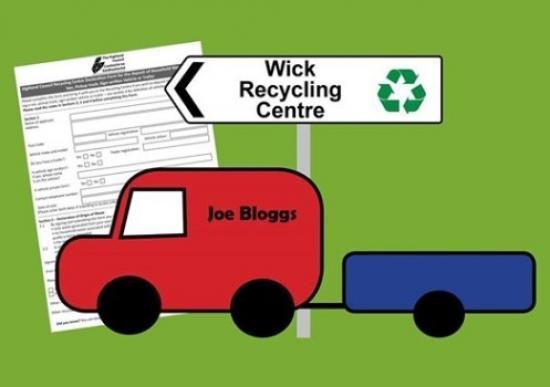New Restrictions on construction and demolition waste at recycling centres
19th August 2019

Measures to be put in place to cut down amount of construction and demolition waste collected at Household Waste Recycling Centres.
The Highland Council will be putting measures in place to restrict the amount of construction and demolition waste bought to its network of 21 Household Waste Recycling Centres. To coincide with these changes that come into force on 1 November 2019 this year, the Council's Bulky Uplift service will be expanded to include small amounts of DIY material.
The Highland Council manages 22% more waste per person than the Scottish average which equates to an additional 24,000 tonnes of waste a year, costing up to £2.4m in handling and treatment costs.
Much of the additional waste at Recycling Centres is construction and demolition waste such as rubble, plasterboard, timber, old kitchen units and bathroom suites. The council has no statutory duty to accept this kind of waste but has previously allowed householders to deposit wastes of this type.
At today’s Environmental, Development and Infrastructure Committee members gave their approval to the implementation of the changes that will limit quantities of construction and demolition waste accepted at Highland recycling centres to small amounts generated through minor DIY activities only.
The changes are expected to save the Council £0.3m over two years.
Under the changes trailers over 2.4 metres, vans over 3.5 tonnes, tippers and trucks will not be permitted to any Highland Council recycling centre with any waste. Householders will be allowed to bring small quantities of construction and demolition waste but this will be restricted to what can be transported in the boot of a car and householders will be limited to one visit one visit per day with this material. These restrictions will not apply to normal household waste such as furniture, white goods and garden waste.
The Council’s Bulky Uplift Service is a chargeable collection available to householders only. Under the new arrangements a number of items previously excluded will be permitted. They include bathroom suites and sanitary ware, bicycles, car wheels and tyres, doors, kitchen units, lawnmowers and garden tools and window frames. The charge for this service is £22.69 for 1 - 3 items and £45.37 for 4 – 6 items.
Chair of the Committee, Cllr Allan Henderson said: "These new measures will help to ensure that the commercial and trade waste producers are not taking advantage of the services we offer members of the public at our network of recycling centres. Householders undertaking small-scale home improvements will still be able to take small quantities of waste materials to our Recycling Centres but we are asking everyone to step up and take more responsibility for their own waste. It is not a statutory function for the council to undertake and we are not in a position to subsidise the cost, especially when it comes to construction and demolition waste.
“If anyone is using a commercial company or a tradesman to carry out DIY jobs for them, they need to make sure that arrangements are in place for materials to be disposed of correctly."
The new arrangements will be implemented from November 1st 2019.
Related Businesses
Related Articles
Exciting Career Opportunities With The Highland Council Now Open For Applications
# 10 December 2025 Career opportunities with The Highland Council The Highland Council is looking to fill a variety of posts relating to civil engineering and flood risk management based in locations across the area. Included are opportunities specifically for civil engineering graduates and technicians, providing the ideal job with career progression for anyone recently qualified and ready for a varied and interesting role.
What the NC500 Research Projects Are Designed to Do - and Why They Matter for the Highlands
As the North Coast 500 approaches its tenth anniversary, it has become one of Scotland's most well-known tourism success stories. The 516-mile loop around the far north of the Highlands has been celebrated internationally, marketed as a world-class road trip, and credited with transforming visitor numbers in some of Scotland’s most remote areas.Help Shape the Future of Thurso
The Highland Council is inviting people that live, work, or study in Thurso, to come along to the public consultation events to have their say. This is an opportunity to help shape the future of Thurso, to gather views and ideas.
Are Scottish Councils Quietly Reversing Outsourcing? A Look at Insourcing, Cuts and the Highland IT Shift
A notable article in the Guardian on 6 December 2025 noted the high sums being paid by London councils outsourcing services to private firms. The article starts with the reduction in council funding by UK government since 2010.Council welcomes Visitor Levy flexibility plan
The Highland Council welcomes moves by the Scottish Government to introduce greater flexibility on how it could design a Visitor Levy Scheme for consultation. The Visitor Levy (Scotland) Act 2024 currently provides local authorities with discretionary powers to implement percentage-based levies following statutory consultation.Highland Council is reaching out for views to shape its next 26/27 budget.
As it looks to set out its forthcoming priorities, the council is seeking involvement from members of the public, including businesses, community groups, parents, and young people. All their opinions are going to be crucial in deciding how Highland Council will take on its budget challenge for 2026-2027.Have your say in Thurso's future £100million investment by attending public consultation events
Thurso is to benefit from £100m investment in education and community facilities and are rolling out the first phase of public consultations on 9 and 10 December 2025. The Highland Council is inviting people that live, work, or study in Thurso, to come along to the public consultation events to have their say; this is an opportunity to help shape the future of Thurso, to gather views and ideas.Finding new owners for empty homes - Scheme launched to help return more empty homes to active use
A new online portal has been launched to bring empty homeowners together with prospective buyers or developers with the aim of facilitating more properties to be used as homes again. Covering the whole of Scotland, this builds on the success of local pilots, referred to as "matchmaker schemes".Consideration for short term let control area in Skye and Raasay
Steps towards introducing a short term let control area have been considered by Highland Council's Isle of Skye and Raasay area committee. On Monday (1 December 2025) the committee heard evidence to justify the grounds for the introduction of a Short Term Let Control Area covering all or part of Skye and Raasay.Workforce North event spotlights Highland economy
EMPLOYERS and educators from across the Highlands have gathered to hear how a new initiative is aiming to transform the region's economy. Workforce North - A Call to Action brought together business leaders and teachers from primary and secondary schools from across the Highland Council area with a wide range of partners geared towards education, learning and skills development at Strathpeffer Pavillion.
